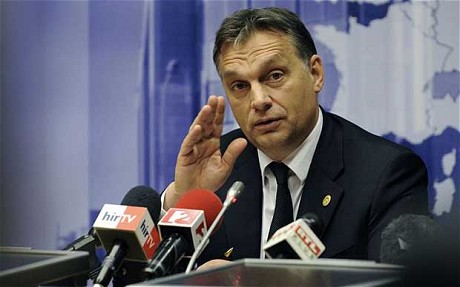
Hungary Casts Serious Doubt on the Nabucco Project
Publication: Eurasia Daily Monitor Volume: 9 Issue: 90
By:

Hungary has raised some serious questions about the viability of the Nabucco gas pipeline project and the performance of the project company’s management. The Hungarian critique has strongly reverberated in all quarters: at the EU in Brussels, among the Nabucco partner-governments, within the project consortium and in Azerbaijan, which is the only possible source of gas for any pipeline’s first stage (whether Nabucco or its two remaining rivals). Responding to that critique, all the other players within and near the Nabucco project have reaffirmed their interest in the reconfigured Nabucco-West, albeit not unconditionally (see accompanying article).
On April 23 in Brussels, Hungarian Prime Minister Viktor Orban described Nabucco as a deeply troubled project, and predicted that Hungarian MOL would withdraw from the project consortium. While acknowledging that Budapest needed Nabucco to reduce dependence on one supplier [Russia], Orban nevertheless expressed hope for Hungary to be included in Gazprom’s South Stream project, if implemented. He seemed to assume that project would move forward and, in that case, “better to be in than out.” Orban made these comments extemporaneously, responding to questions following his speech at the European Policy Center in Brussels and on the eve of his scheduled meeting with the European Commission (MTI, EurActiv, April 24).
On April 26 in Budapest, Hungarian MOL elaborated on the company’s view of the Nabucco project. In a briefing by its top two officials and a press release, MOL cited Nabucco’s cost overruns, persistent uncertainties over funding and lack of guaranteed supplies of gas. Ten years after the project’s inception, “hardly anyone can say today what exactly this project is, and how much it would cost to build it.” MOL had raised these concerns within the Nabucco consortium since 2010, but to no avail. It also had raised its concerns about the project company’s “structure and management.”
Consequently, MOL is prepared to sell its stake in the Nabucco consortium; it does not approve the project company’s operating budget for 2012, and is withholding disbursement of MOL’s contribution to that budget. According to its top management, MOL remains committed to the goal of diversifying Hungary’s and the entire region’s gas supplies and, if the Nabucco project is eventually implemented, “nothing would stand in the pipeline’s way through Hungary” (MTI, Dow Jones, April 26).
MOL’s wholly-owned subsidiary Natural Gas Transmission (FGSZ) is one of the six equal shareholders (16.67 percent each) in the Nabucco consortium. MOL itself is 24.5 percent state-owned but the company speaks on its own behalf, not for the government.
Beyond energy supply issues, there is also a political dimension to Orban’s unexpected change of attitude. The European Commission along with the IMF are delaying credit guarantees necessary to crisis-hit Hungary. The European Commission demands changes to certain Hungarian laws, effectively setting some political conditions to the anti-crisis measures for Hungary. Such conditionality seems unprecedented and, if so, discriminatory.
Orban’s remarks on South Stream in Brussels might be seen as a form of pushback or seeking counter-leverage. Such a dynamic, once started, can spin out of either side’s control. More productively, the European Commission might pursue its concerns in parallel with releasing that package instead of setting political-normative preconditions to urgently needed anti-crisis measures.
The Nabucco pipeline project (Turkey, Bulgaria, Romania, Hungary, Austria and the German RWE), favored by the European Commission in recent years, lost credibility all around in its original configuration. The final tipping point of credibility loss (in that configuration) can be traced to late 2011 (see EDM, November 2, 3, 2011; January 31, 2012). Since December 2011, the Azerbaijani-Turkish Trans-Anatolia pipeline project (TANAP) has replaced the Nabucco project on Turkey’s territory. TANAP presupposes a continuation pipeline from the Turkish-Bulgarian border into Central Europe. The Nabucco project is being reconfigured for that role as “Nabucco-West,” shorter and more bankable.
Hungary’s critique is convincing on a number of counts. It is grounded in the Nabucco project’s pre-2012 history. It can help focus attention on past omissions by the project management and the corresponding lessons learned. These include outdated or overoptimistic estimates of construction costs (increasingly questioned and challenged with the passage of time); unrealistic expectations to access gas in Iraq’s Kurdish region or in Egypt (also discounting the additional transportation costs); and failure to include a major gas producing company in the Nabucco consortium (its members’ gas-related activities are mainly in trading and transportation). Ultimately, these and other omissions made Nabucco look unpersuasive, despite the European Commission’s dedicated support for the project. A sense of Nabucco-fatigue had taken over by 2011 in most quarters.
A critique grounded in the past, however, seems to discount the Nabucco project’s recent reconfiguration as Nabucco-West. This would continue the planned Trans-Anatolia line into EU territory from the Turkish-Bulgarian border to the Baumgarten continental hub near Vienna. With Azerbaijan taking charge of Nabucco’s former Turkish section, the cost of building Nabucco-West could be 50 percent lower than the cost of Nabucco’s previous version (Financial Times Deutschland, May 1).
The Hungarian statements stopped short of mentioning Nabucco’s rival project, the South-East European Pipeline (SEEP), promoted by British Petroleum (BP) since September 2011. Both compete over the same 10 billion cubic meters of Azerbaijani gas per year from Shah Deniz Phase Two of production. While Nabucco would run to Baumgarten (see above), SEEP would end in Hungary, using interconnectors onward to Austria and Croatia. This quasi-hub feature of SEEP may well look attractive to Hungary.
The Shah Deniz gas producers’ consortium has set a May 16 deadline for Nabucco and BP to submit their respective proposals. Within the producers’ consortium, Azerbaijan’s State Oil Company favors Nabucco-West linked to the planned Trans-Anatolia pipeline (Trend, May 1).




